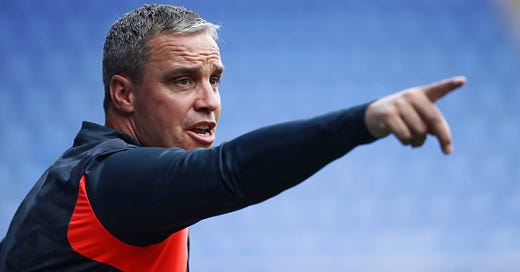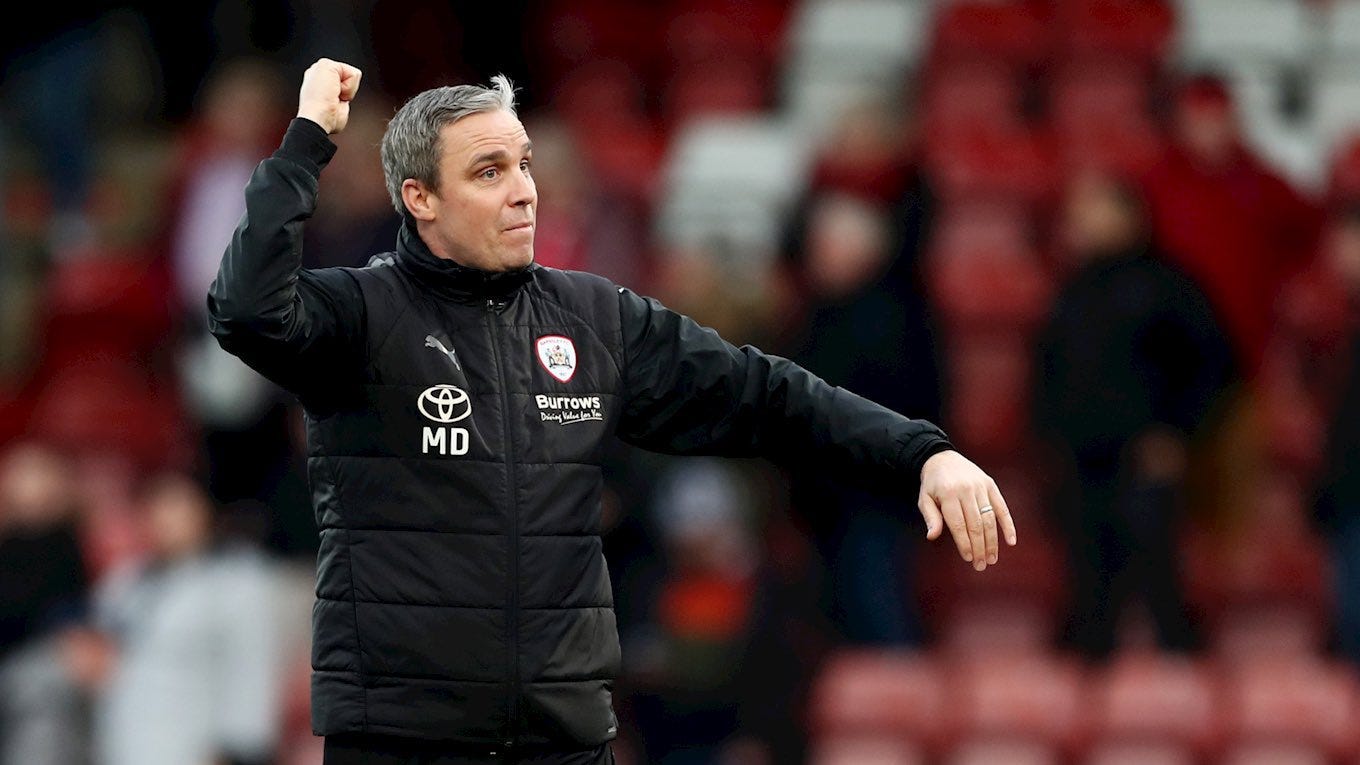A Duff Hand Played Badly
Replacing Russell Martin at Swansea was always going to be tough for the former Barnsley boss, but a string of unforced errors have made his position seem untenable
Nobody was shocked to see Michael Duff land a Championship job in the summer. Since taking his first steps into management in 2018, he has made a name for himself as an intelligent and versatile tactician, capable of exceeding expectations at both ends of the table.
However, it was a surprise to see Swansea City as his destination. Few EFL clubs have established such a clear identity as Swans in the past two decades. From Roberto Martinez and Brendan Rogers to Graham Potter and Russell Martin, most head coaches in SA1 have tried to play ‘The Swansea Way’, with possession of the ball the cornerstone of their tactics.
For all of Duff’s success, he has never been a keep-ball disciple. He took Cheltenham into League One using a high-pressing system and focusing on set pieces, kept them there by setting up in a low block and switched back to the more aggressive off-the-ball approach when taking Barnsley to the brink of promotion to the Championship.
When the ex-Burnley defender started work in South Wales he was left with the awkward choice of coaching a style he was uncomfortable with or one his players were wholly unsuited to.
So far, he has kept some of Martin’s ideas, and junked others. Despite the ethos of gradual change being a sensible one, Duff has somehow managed to mould together a system which has neutralised the strengths of the team he inherited while also failing to deal with the problems that pre-date his arrival.
Worryingly, Swans have moved away from their previous identity and are yet to find a new one to replace it. They rank 10th for possession but 20th for shots taken and have scored just 10 times in eight matches. Without the presence of prolific forward Joel Piroe and creative wingback Ryan Manning, who were responsible for 36 goal contributions between them last year, the attack is pedestrian and lacks cutting age.
Not only that, but the defensive stinginess Duff instilled at Barnsley is nowhere to be seen either and the mishaps that dogged Martin’s tenure continue to persist. On opening day, goalkeeper Carl Rushworth gifted a goal to Birmingham City though his profligacy when playing the ball out and the back three still look vulnerable when the opposition deliver high balls into the Swansea box.
Last season these frailties at the back were the difference between the playoffs and midtable but with goals at the other end harder to come by, Swans now look set for a relegation fight, with just one victory from eight so far. The pressure is well and truly on Duff. Crucially his fractious relationship with the fanbase is an even greater cause for concern than the results.
Alarm bells started to ring before the grudge match with local rivals Cardiff City when Duff claimed that he would rather win promotion and lose to the Bluebirds than beat them and not go up. Logically, his statement was a fair one; reaching the Premier League is Swansea’s main goal. However, with the team in the bottom three at the time, talk of competing at the top of the table seemed so alien as to be almost entirely worthless and consequently, the boss’s words served only to diminish the importance of a game which could have served as a catalyst for an upturn in form.
Managers emphasising to fans that they understand the significance of local derbies can get a little tedious but there’s a reason they do it; it’s positive PR for free. And with things going badly on the pitch, it was an opportunity that Duff should have grabbed with both hands.
When Swansea suffered a 2-0 reverse, halting a run of four consecutive wins in the fixture, the backlash among supporters was more furious than it needed to be. Yet instead of showing contrition, the boss doubled down, claiming that winning the fans over “isn’t his job.” He even appeared to throw the players under the bus, implying they had not been following the agreed gameplan.
For those who have followed Duff’s career, this behaviour is surprising. Abrasive remarks in press conferences have been the downfall of many an EFL manager but Duff does not have a history of making antagonistic comments.
On paper, Swansea is not the most obvious environment for a meltdown either. When Nathan Jones swapped a Luton side punching above their weight in the Championship for Southampton, it was little surprise that he struggled. The brashness and extreme levels of self-belief which had formed the basis of an unstoppable underdog spirit at Kenilworth Road predictably did not endear him to a dressing room full of seasoned Premier League operators. On the other hand, Duff’s arrival at the Swansea.com Stadium was the culmination of slow and steady progression in a career which has never relied on provoking reactions to succeed.
Perhaps the real reason for Duff’s troubles is that this is the first time he has faced meaningful pressure. He left both of his previous jobs of his own accord and has matched or exceeded expectations in all five previous seasons of professional management.
Regardless, a sluggish start was an eventually he should have prepared for. His Barnsley side took a couple of months to click into gear and having taken over a squad built to play a very specific way, missing their two key men from the previous campaign, another slow burner at Swansea was always likely. The smart calculation would have been to endear himself to the fans through positive engagement to buy himself more time to turn results around, however the exact opposite has happened.
Relations are now so damaged that getting back to winning ways may not be enough to salvage the appointment. Saturday’s 3-0 victory over Sheffield Wednesday side lifted Swans out of the bottom three. The boos greeted Duff even after such a positive result provided an uncomfortable reminder that while managers can come back from a few bad performances, when they lose the respect of the fans, rarely is it retrievable.
The Swansea job was always going to be a tough assignment for Duff. Taking over a club with a reputation for playing a brand of football he was not used to coaching was hardly ideal. However, Swansea weren’t among the promotion favourites this season and fans can tolerate bad results in a transition period provided everybody at the club is pulling in the same direction.
Bluntly, Duff has failed on almost every count since he walked through the door. Whatever the circumstances he inherited, if removed from his position, having trashed any goodwill he may have once had within the space of a few months, he will only have himself to blame.






